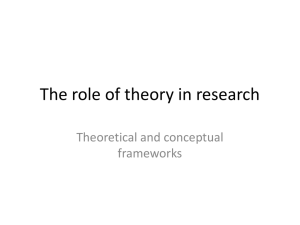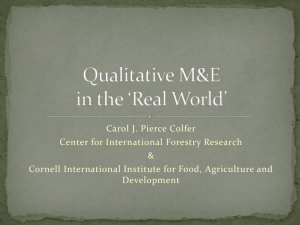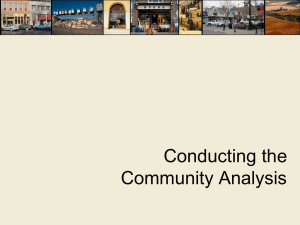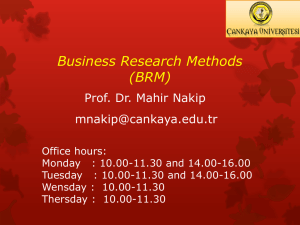Microsoft PowerPoint - the NCRM EPrints Repository
advertisement
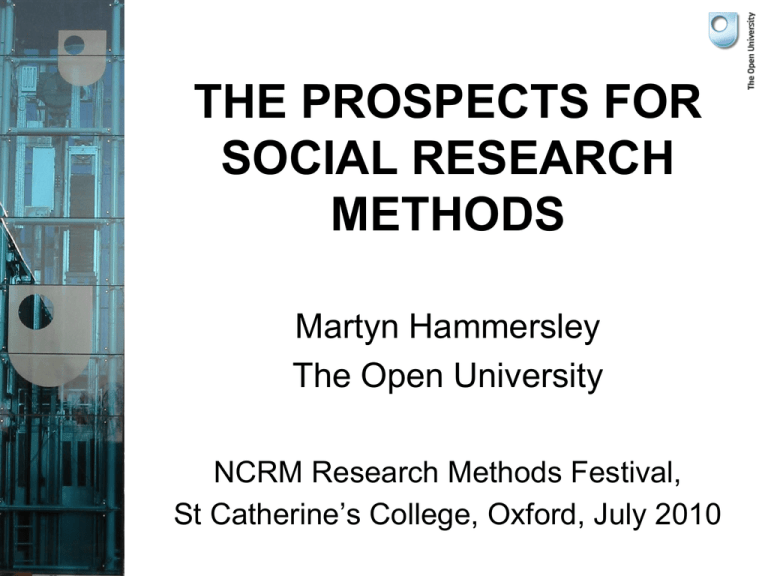
THE PROSPECTS FOR SOCIAL RESEARCH METHODS Martyn Hammersley The Open University NCRM Research Methods Festival, St Catherine’s College, Oxford, July 2010 Social Research, Methods, or Methodology? • ‘Methodologists remind me of people who clean their glasses so thoroughly that they never have time to look through them’ (Freud, cited in Sterba 1982:120) • ‘[…] sociology is the science with the greatest number of methods and the least results’ (Poincaré 1908:19-20) Prospects? • What we want to happen? • What we fear may happen? • What we hope will happen? • Or what we expect to happen? Looking forward to 2020? (I’m not!) Avoiding a ‘too pessimistic’ scenario: • Minus the effects of increasing ‘strategic management’ of research. • Minus the stifling effect of ethical regulation. • Minus the consequences of the recession. • Minus the impact of climate change on society as a whole. What I’m Not Going To Talk About! • Future technological possibilities, and their methodological implications. • New philosophies that might shape the practice of social research. • The methodological implications of tackling new topics. • New opportunities for ‘impact’ and their demands. On the idolatry of the new, see Travers 2009 Back to the Future: Paradigm Wars? ‘As I begin this history, we have arrived at the year 2009 […] and are looking back at what happened in research […] during the two decades since 1989’ (Gage, N. ‘The paradigm wars and their aftermath’, Educational Researcher, 18, pp4-10, 1989) Gage’s alternative scenarios 1. The triumph of the qualitative. 2. Rapprochment between the paradigms. 3. Paradigm war continues unabated. So, what has actually happened? Peace? In an article entitled ‘Paradigm peace and the implications for quality’, Alan Bryman wrote: ‘To a very large extent, the paradigm wars can be considered over and peace can be regarded as having broken out’ (2006:113); though he noted that there were still ‘occasional skirmishes’. In a later article (2009), entitled ‘The end of paradigm wars?’, he continued the same theme, though as the title indicates with rather more uncertainty about the situation. Or war? After writing a 2009 book entitled Qualitative Inquiry Under Fire, Norman Denzin has just published another book, this time with the title: The Qualitative Manifesto: A Call to Arms (Left Coast Press, 2010) Advertising blurb for this reads ‘[Denzin] is the voice of a fine angry angel leading us into the political battle of narratives currently defining, and contesting, qualitative research’ (Bud Goodall) The Proliferation of Qualitative ‘Paradigms’ • Ethnography (often with a qualifying adjective: ‘interpretive’, ‘critical’, ‘feminist’, ‘postmodern’, ‘sensory’, etc.) • Conversation analysis (different versions) • Discourse analysis (with many qualifiers) • Narrative analysis (thematic, structural, etc) • Biographical work (of various kinds) • Qualitative interview studies of lived experience • QCA and other kinds of configurational analysis Proliferation at the Level of Methodological Philosophy • • • • • • • • • Empiricism/positivism Post-positivism and ‘neo-realism’ Critical Realism Ethnomethodology Constructionism Pragmatism Socio-cultural approaches Relativism Postmodernisms Good Diversity and Bad Diversity? + Diversity that reflects differences in type of research (academic or practical) and/or in the sort of question being addressed. − Diversity that involves turning research into something else, for example politics or art, or denying that explanatory knowledge (as traditionally understood) is possible. Stanley Fish’s injunctions • Don’t try to do anyone-else’s job. • Don’t allow anyone else to do your job. (Fish, S. 2008 Save the World on Your Own Time) An addition very much in the same spirit: • Don’t deny that your job is possible while still drawing the salary. A Parallel Universe? The Encouraging Case of Political Science ‘Over the past decade, the field of political science has witnessed a renaissance in qualitative methods. […] Since the mid1990s […] a surge of new scholarship has [resulted] in a new qualitative methods canon.’ (Bennett and Elman 2006:455) Complex Causality ‘Qualitative methodologists tend to believe that the social world is complex, characterized by path dependence, tipping points, interaction effects, strategic interaction, two-direction causality or feedback loops, and equifinality (many different paths to the same outcome) or multifinality (many different outcomes from the same value of an independent variable, depending on context.)’ (Bennett and Elman 2006:457) Two cultures in communication ‘In this essay, we tell a tale of […] two cultures. We do so from the perspective of qualitative researchers who seek to communicate with quantitative researchers. Our goal is to contrast the assumptions and practices of the two traditions toward the end of enhancing cross-tradition communication.’ (Mahoney and Goertz 2006:228) Different Goals, Different Practices ‘We […] believe that [quantitative and qualitative] scholars pursue different specific research goals, which in turn produce different norms about research practices. […] Having said this, […] we wish to stress that our intention is not to criticize either quantitative or qualitative researchers. In fact, we argue throughout that the dominant practices of both traditions make good sense given their respective goals’ (Mahoney, J. and Goertz, G. 2006:228) Options • Qualitative or quantitative imperialism. • Mutual tolerance for equally legitimate approaches. • Mixing quantitative and qualitative methods under the auspices of some new methodological paradigm. • Transformation of both traditions. A Contentious Conclusion • Causal analysis is the primary task of social research. • Neither quantitative nor qualitative practices are very effective at this task. • We need critical interrogation of both to determine the limits to current capabilities, and to decide how best to pursue what is possible. • Unfortunately, there are increasing pressures on social science to exceed its capabilities, for example to try to solve policy problems or change the world. These must be resisted. References Bennett, A. and Elman, C. (2006) ‘Qualitative research: recent developments in case study methods’, Annual Review of Political Science, 9, pp455-76. Bryman, A. (2006) ‘Paradigm peace and the implications for quality’, International Journal of Social Research Methodology, 9, 2, pp111-126. Bryman, A. ‘The end of paradigm wars?’, in Alasuutari, P. et al (eds.) Handbook of Social Research Methods, Los Angeles, Sage, 2008. Denzin, N. K. (2009) Qualitative Inquiry Under Fire, Walnut Creek CA, Left Coast Press. Denzin, N. K. (2010) The Qualitative Manifesto: A Call to Arms, Walnut Creek CA, Left Coast Press. Fish, S. (2008) Save the World on Your Own Time, New York, Oxford University Press. Gage, N. ‘The paradigm wars and their aftermath’, Educational Researcher, 18, pp4-10, 1989. Hammersley, M. (2008) Questioning Qualitative Inquiry, London, Sage. Mahoney, J. and Goertz, G. (2006) ‘A tale of two cultures: contrasting quantitative and qualitative research’, Political Analysis, 14, pp227-49. Poincaré, H. (1914) Science and Method, London, Nelson. Sterba, R. (1982) Reminiscences of a Viennese Psychoanalyst, Detroit ILL, Wayne State University Press. Travers, M. (2009) ‘New methods, old problems: sceptical view of innovation in qualitative research’, Qualitative Research, 9, 2, pp161-79.



